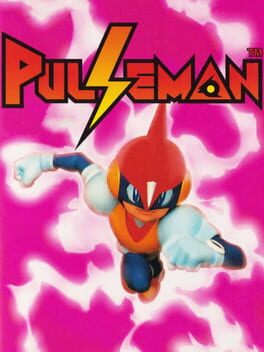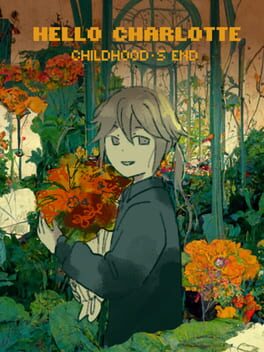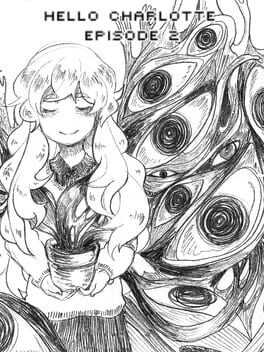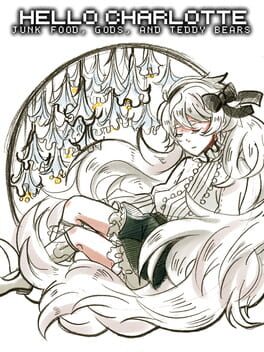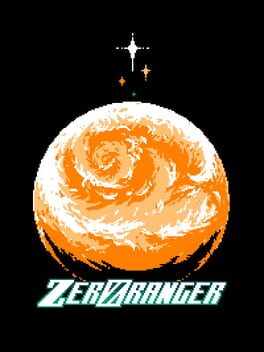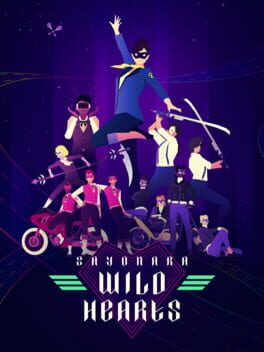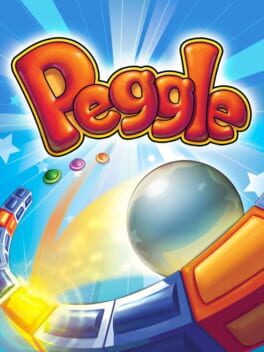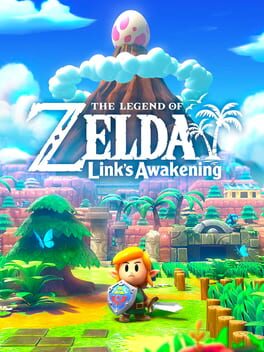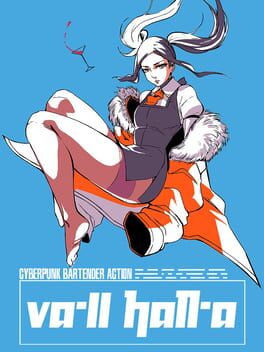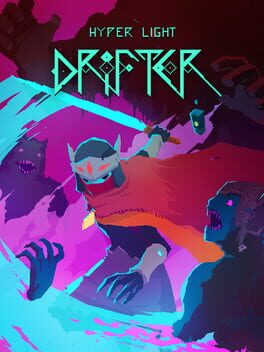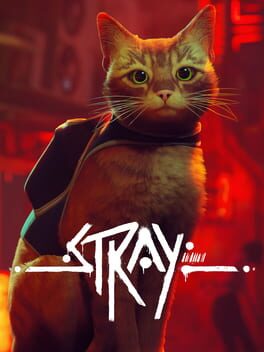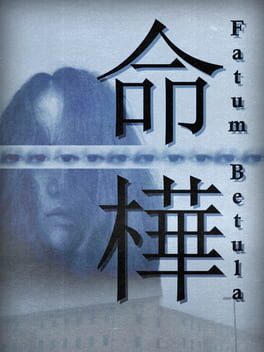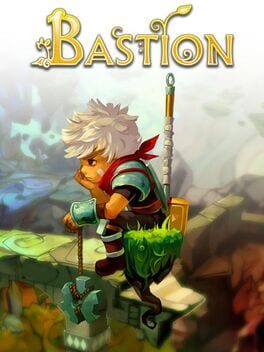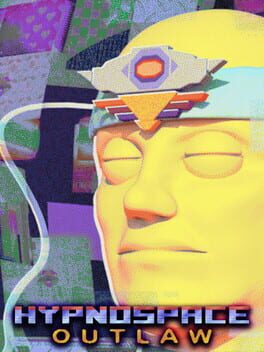1994
It's always interesting to see conceptualizations of cyberspace from a time where computers weren't as commonplace as they are now. Psychedelic envisionings of worlds beyond our understanding, full of colorful and evocative imagery. In reality, a world of computers would most likely be formulaic and rigid, but who's to say that that has to be the case in fiction?
Pulseman does a few interesting things with this. The style and worlds are extremely beautiful and compelling, with cyberspace often feeling like a surreal dream. Pastel colors and trees that spin in the background, robotic birds and vector-based monsters traversing through the feverish landscapes. Pulseman, in addition to this, also has some amount of linear rigidity to its designs, though. Each level feels boxy. Mechanically concise. Efficient.
The imagined world of cyberspace and the direct world of assembly are one and the same in Pulseman, a fusion of conceptualization and simplification. Maybe, Pulseman argues, there is room for both a distinct style and mechanical focus.
Just maybe.
Then again, the actual mechanics of Pulseman aren't particularly captivating - while you're in awe at its stylistic choices, you'll probably notice that the levels you're blasting through don't have much going on in the department of actual play. Every level is a simple act of using your immense amount of tools, like your static charge that can become an electric ball or be used to become a whirling wheel of death that bounces off the walls, to obliterate everything in your path. This dissonance between the perceived harmony of style and substance and the actual lack of substance can be a bit jarring. There is no true harmony between the efficiency of technology and the artistic style of the human mind because the level designs simply aren't as interesting in their efficacy as they could be.
But damn. Talk about style!
Pulseman does a few interesting things with this. The style and worlds are extremely beautiful and compelling, with cyberspace often feeling like a surreal dream. Pastel colors and trees that spin in the background, robotic birds and vector-based monsters traversing through the feverish landscapes. Pulseman, in addition to this, also has some amount of linear rigidity to its designs, though. Each level feels boxy. Mechanically concise. Efficient.
The imagined world of cyberspace and the direct world of assembly are one and the same in Pulseman, a fusion of conceptualization and simplification. Maybe, Pulseman argues, there is room for both a distinct style and mechanical focus.
Just maybe.
Then again, the actual mechanics of Pulseman aren't particularly captivating - while you're in awe at its stylistic choices, you'll probably notice that the levels you're blasting through don't have much going on in the department of actual play. Every level is a simple act of using your immense amount of tools, like your static charge that can become an electric ball or be used to become a whirling wheel of death that bounces off the walls, to obliterate everything in your path. This dissonance between the perceived harmony of style and substance and the actual lack of substance can be a bit jarring. There is no true harmony between the efficiency of technology and the artistic style of the human mind because the level designs simply aren't as interesting in their efficacy as they could be.
But damn. Talk about style!
2004
Meaning is an inherently limiting concept. There's only so much you can do when you're limited to just blunt concepts - ones that you need words to explain, linear ideas proselytized to people. Art with meaning is fantastic, but art without meaning can be beautiful. Yume Nikki is a profound example of that.
There's not much to say about Yume Nikki that hasn't already been said, which pains me a bit. Yume Nikki is an ethereal set of listless atmospheres, ones you traverse with no particular aims in mind. You explore the dreams of a young girl and experience the sights and sounds. To concern yourself with their meaning is to miss the point. Yume Nikki is a game that is simply about the act of seeing these things, of existing in this world.
Sure, there are cases to be made for things in the text being important focuses. I mean, a version of Madotsuki is literally shown hiding in a closet at one point, which is ripe for queer reading. There's also the game's fixation on car accidents, with an entire character becoming mangled when you show her a stop light. I think that the very act of applying meaning, though, misses the point of what makes this so special.
This is not a game that is to be understood, it is a game that rejects the premise of understanding entirely. It is a game of exploring these landscapes, and taking them in and acknowledging them, but not ruminating on them for very long. To do so removes them of the mystique that they gave us in the first place.
The dream diary eludes understanding.
There's not much to say about Yume Nikki that hasn't already been said, which pains me a bit. Yume Nikki is an ethereal set of listless atmospheres, ones you traverse with no particular aims in mind. You explore the dreams of a young girl and experience the sights and sounds. To concern yourself with their meaning is to miss the point. Yume Nikki is a game that is simply about the act of seeing these things, of existing in this world.
Sure, there are cases to be made for things in the text being important focuses. I mean, a version of Madotsuki is literally shown hiding in a closet at one point, which is ripe for queer reading. There's also the game's fixation on car accidents, with an entire character becoming mangled when you show her a stop light. I think that the very act of applying meaning, though, misses the point of what makes this so special.
This is not a game that is to be understood, it is a game that rejects the premise of understanding entirely. It is a game of exploring these landscapes, and taking them in and acknowledging them, but not ruminating on them for very long. To do so removes them of the mystique that they gave us in the first place.
The dream diary eludes understanding.
This review contains spoilers
Fiction is a powerful tool.
Through the phenomenological panopticon of worlds that we engage with in their entirety, we create our own realities. We create fantasies that we tell ourselves and exist in, as real as anything outside that. We know of everything inside them and seek to understand them, and in turn, understand ourselves.
These things are beautiful. These stories are what help us become more human, help us understand each other. They're what make us unique. We share our stories with each other to lighten our own burdens, and in turn, we listen to share the loads of others.
Childhood's End disagrees with me, though. It sees stories as not things of beauty, but a parasite. A means to an end - "creators shit out content from their asses", as it so... tactfully puts it. The beauty of stories and the worlds they create are portrayed as grotesque and aberrant, as merely coping mechanisms. Stories are creatures that fester inside your thoughts so they can be reproduced into other minds and endlessly continue their lineage.
Maybe it's wrong. Maybe it's right. I don't particularly care either way. What I do care about is that this game is cynical to the end - and in ways that don't interest me. A teenager commits suicide and it's treated as some romantic escape from suffering. A girl deeply in love is framed in the text as a crazed stalker. Sexual asasult is regularly brought up as a backstory plot device for no meaningful reason. One of the main characters herself even monologues about how art is nothing and means nothing, that it is only content to be consumed.
Stories are beautiful. Art is beautiful. The human experience is beautiful. Why make something so pointedly spiteful and mean-spirited?
This game only seeks to make its player suffer in their personal panopticon, helplessly watching, a terrible prank on those doomed to play it.
Through the phenomenological panopticon of worlds that we engage with in their entirety, we create our own realities. We create fantasies that we tell ourselves and exist in, as real as anything outside that. We know of everything inside them and seek to understand them, and in turn, understand ourselves.
These things are beautiful. These stories are what help us become more human, help us understand each other. They're what make us unique. We share our stories with each other to lighten our own burdens, and in turn, we listen to share the loads of others.
Childhood's End disagrees with me, though. It sees stories as not things of beauty, but a parasite. A means to an end - "creators shit out content from their asses", as it so... tactfully puts it. The beauty of stories and the worlds they create are portrayed as grotesque and aberrant, as merely coping mechanisms. Stories are creatures that fester inside your thoughts so they can be reproduced into other minds and endlessly continue their lineage.
Maybe it's wrong. Maybe it's right. I don't particularly care either way. What I do care about is that this game is cynical to the end - and in ways that don't interest me. A teenager commits suicide and it's treated as some romantic escape from suffering. A girl deeply in love is framed in the text as a crazed stalker. Sexual asasult is regularly brought up as a backstory plot device for no meaningful reason. One of the main characters herself even monologues about how art is nothing and means nothing, that it is only content to be consumed.
Stories are beautiful. Art is beautiful. The human experience is beautiful. Why make something so pointedly spiteful and mean-spirited?
This game only seeks to make its player suffer in their personal panopticon, helplessly watching, a terrible prank on those doomed to play it.
This review contains spoilers
It's difficult for me to discuss Hello Charlotte's second episode without inevitably coming back to The Legend of Zelda: Link's Awakening, which is one of my favorite games of all time.
Link's Awakening is a pretty simple game that has some interesting thematic trappings. The island that you're on is a dream, one that is destined to be ended once Link awakens the Wind Fish. It brings a lot to mind about the intersection of dreams and reality. What is real? What isn't real?
It doesn't much matter. The sleepy island of Koholint is one that you'll grow attached to and have as a fixture of your memories, one that will exist and bring you emotions throughout the rest of your life. It will live on that way. In some sense, this is what all worlds are like. We only know that they exist because we understand that they do.
The grey ending of Requiem Aeternam Deo has the revelation that Charlotte created the entire world and that she was its center the entire time. This comes at no surprise - after all, every character in the game centers themselves around Charlotte, from Anri, who is her best friend and has an unhealthy attachment to her, to the regular NPCs who tell Charlotte they aren't good enough to sit with her. Everything is about her, all of her hardships come from her difficulty in taking action to manifest her inner ideas and world.
With all that being said, Link's Awakening is so much more subdued, much more charming, and much easier to digest. Hello Charlotte' EP2 bounces its ideas all over the place, and doesn't really end up tying them together neatly by the end. It's a shame, because there's potential here, but it's buried by so much stuff (much of it being annoying or trite) that's it hard to wade through it. What we have here is a work that not only feels inconsistent within itself, but inconsistent with its previous entry as well despite their direct connection.
When you try to find coherent meaning to follow in Hello Charlotte, the abyss stares back.
Link's Awakening is a pretty simple game that has some interesting thematic trappings. The island that you're on is a dream, one that is destined to be ended once Link awakens the Wind Fish. It brings a lot to mind about the intersection of dreams and reality. What is real? What isn't real?
It doesn't much matter. The sleepy island of Koholint is one that you'll grow attached to and have as a fixture of your memories, one that will exist and bring you emotions throughout the rest of your life. It will live on that way. In some sense, this is what all worlds are like. We only know that they exist because we understand that they do.
The grey ending of Requiem Aeternam Deo has the revelation that Charlotte created the entire world and that she was its center the entire time. This comes at no surprise - after all, every character in the game centers themselves around Charlotte, from Anri, who is her best friend and has an unhealthy attachment to her, to the regular NPCs who tell Charlotte they aren't good enough to sit with her. Everything is about her, all of her hardships come from her difficulty in taking action to manifest her inner ideas and world.
With all that being said, Link's Awakening is so much more subdued, much more charming, and much easier to digest. Hello Charlotte' EP2 bounces its ideas all over the place, and doesn't really end up tying them together neatly by the end. It's a shame, because there's potential here, but it's buried by so much stuff (much of it being annoying or trite) that's it hard to wade through it. What we have here is a work that not only feels inconsistent within itself, but inconsistent with its previous entry as well despite their direct connection.
When you try to find coherent meaning to follow in Hello Charlotte, the abyss stares back.
The panopticon only seeks to observe its quarry, not to protect. It is a cruel method of torture that only exists to make those within it obey. A hypothetical prison system wherein all inmates feel as if they're being observed at all times, even if it's physically impossible for the guard to always be looking at them. It's a barbaric conceptualization of a system that is already abusive in its practices to those who have to suffer in it - one where privacy is a myth.
Hello Charlotte is an interesting implementation of these ideas. Instead of a traditional panopticon, where a single guard goes around a loop to observe all the inmates, it is now the observation and total control over the body of a single human, known as a "puppet" within the game's context. The player themselves is also referred to as the observer. It is our job to watch over Charlotte - but not keep her safe. Time and time again, we watch Charlotte die. Open a box? The universe becomes a singularity. Touch a teddy bear? It impales her. Death is no stranger to Charlotte.
She doesn't remember each and every cycle, each and every mistake we make that ends up killing her, but we do. We see every one, we observe each one, and all for what? Just to see a satisfying ending to the tale? How complicit are we as the observer, someone who is controlling her actions as a quantum entity through our own perception of them?
As the guard in the panopticon, we seek only to ensure that Charlotte achieves her tasks as we are ordained to do so by higher powers. No matter how many times she has to die for that to happen.
Nothing more, nothing less.
Hello Charlotte is an interesting implementation of these ideas. Instead of a traditional panopticon, where a single guard goes around a loop to observe all the inmates, it is now the observation and total control over the body of a single human, known as a "puppet" within the game's context. The player themselves is also referred to as the observer. It is our job to watch over Charlotte - but not keep her safe. Time and time again, we watch Charlotte die. Open a box? The universe becomes a singularity. Touch a teddy bear? It impales her. Death is no stranger to Charlotte.
She doesn't remember each and every cycle, each and every mistake we make that ends up killing her, but we do. We see every one, we observe each one, and all for what? Just to see a satisfying ending to the tale? How complicit are we as the observer, someone who is controlling her actions as a quantum entity through our own perception of them?
As the guard in the panopticon, we seek only to ensure that Charlotte achieves her tasks as we are ordained to do so by higher powers. No matter how many times she has to die for that to happen.
Nothing more, nothing less.
2018
Investment is hard for me.
A lot of works of art give me reasons to care right out the gate. Interesting characters with motivations and conflicts that I emotionally resonate with or thick and mysterious atmospheres that implore me to go deeper. Occasionally I'll find a work with gameplay mechanics that engage me, but if you've read my other pieces you know that's not something that happens often. It happens so infrequently that I can't cite a single example.
My story with ZeroRanger is a similar one to all the other shoot-'em-ups I've tried to play. I begin playing it and then I realize there's nothing truly there for me. It's why I've stayed away from the genre - it's just not my thing. The endless cycle, one that this game invokes Hindu imagery for as to reference the Samsara and its cyclical reincarnation, of getting better by replaying the same stuff over and over simply isn't appealing to me. Sure, I may achieve enlightenment eventually, but at what cost?
ZeroRanger is more forgiving than the average shoot-'em-up, but it's still not enough to keep me invested. To have to replay the same stages - which aren't particularly interesting once you've solved them, mind you - just makes me feel lifeless. It feels like a job more than art.
I understand that there is something here. That there are some clever things that this game does with form and with shmups in general as a genre. I frankly just don't think I care. Which is a real shame, because I'd love to get more into games like this.
I have a lot of respect for them.
A lot of works of art give me reasons to care right out the gate. Interesting characters with motivations and conflicts that I emotionally resonate with or thick and mysterious atmospheres that implore me to go deeper. Occasionally I'll find a work with gameplay mechanics that engage me, but if you've read my other pieces you know that's not something that happens often. It happens so infrequently that I can't cite a single example.
My story with ZeroRanger is a similar one to all the other shoot-'em-ups I've tried to play. I begin playing it and then I realize there's nothing truly there for me. It's why I've stayed away from the genre - it's just not my thing. The endless cycle, one that this game invokes Hindu imagery for as to reference the Samsara and its cyclical reincarnation, of getting better by replaying the same stuff over and over simply isn't appealing to me. Sure, I may achieve enlightenment eventually, but at what cost?
ZeroRanger is more forgiving than the average shoot-'em-up, but it's still not enough to keep me invested. To have to replay the same stages - which aren't particularly interesting once you've solved them, mind you - just makes me feel lifeless. It feels like a job more than art.
I understand that there is something here. That there are some clever things that this game does with form and with shmups in general as a genre. I frankly just don't think I care. Which is a real shame, because I'd love to get more into games like this.
I have a lot of respect for them.
2019
This review contains spoilers
"open hearts never break forever."
- Woodaba, a writer I deeply respect.
Breakups are hard, especially when you have BPD.
Borderline personality disorder is challenging. It's as if you're covered in emotional third degree burns all over your body, and even the slightest touch or irritation can lead to a spiral. Relationships can be particularly difficult with it, obviously. Even without the stigmatization of the illness that exists in a lot of discussions of romance due to that being such a neurotypical space, being so vulnerable all the time naturally leads to you opening your heart as much as you can to people and loving them fully. Despite how painful it is, it's a comfortable feeling as well, to open up so much to people. It's a blessing and a curse.
One aspect on the curse side of things is that when you love other people so much, you start to lose part of yourself in that love. You define yourself so much through it that it's hard to remember who you were before then. It's something that I know that I've struggled with a lot, and I know many other people who don't have this disorder have struggled with it. It can be hell to repair the pieces of you that have been left behind when part of your identity has torn itself from you.
In Sayonara Wild Hearts, we follow the journey of someone doing exactly that. She journeys through her own subconscious and visits all the aspects of the self that she had forgotten were a part of her. Her friendships, her love of nature, her emotions, her virtual identity and even her own relationship with mortality itself are all manifested as bosses here - all represented through different members of the major arcana in a tarot deck. Instead of closing off her emotions from the pain, she searches them. She feels them. When she resurfaces from her slump, she's ready to love once more.
When you're as vulnerable as I am, this cycle should seem familiar. You've been wounded, and you have to take time to process who you really are again. At the end of that, though, you come to a new understanding of yourself and the world around you - just like all emotionally challenging things. This disorder is agonizing, and I wouldn't wish it on anyone, but without it I wouldn't understand myself as well as I do. I wouldn't be so emboldened to love and feel the highs of emotion.
Without my open heart, I would have never recovered from my ex-boyfriend taking his own life almost two years ago.
Back then, I had told myself I would never love again. But I found it once more. It took a long time to find the pieces of my broken heart to put myself back together, and even then I still don't quite know how to process some aspects of his death, but I keep going. I keep living. I keep loving.
Welcome back, wild heart.
- Woodaba, a writer I deeply respect.
Breakups are hard, especially when you have BPD.
Borderline personality disorder is challenging. It's as if you're covered in emotional third degree burns all over your body, and even the slightest touch or irritation can lead to a spiral. Relationships can be particularly difficult with it, obviously. Even without the stigmatization of the illness that exists in a lot of discussions of romance due to that being such a neurotypical space, being so vulnerable all the time naturally leads to you opening your heart as much as you can to people and loving them fully. Despite how painful it is, it's a comfortable feeling as well, to open up so much to people. It's a blessing and a curse.
One aspect on the curse side of things is that when you love other people so much, you start to lose part of yourself in that love. You define yourself so much through it that it's hard to remember who you were before then. It's something that I know that I've struggled with a lot, and I know many other people who don't have this disorder have struggled with it. It can be hell to repair the pieces of you that have been left behind when part of your identity has torn itself from you.
In Sayonara Wild Hearts, we follow the journey of someone doing exactly that. She journeys through her own subconscious and visits all the aspects of the self that she had forgotten were a part of her. Her friendships, her love of nature, her emotions, her virtual identity and even her own relationship with mortality itself are all manifested as bosses here - all represented through different members of the major arcana in a tarot deck. Instead of closing off her emotions from the pain, she searches them. She feels them. When she resurfaces from her slump, she's ready to love once more.
When you're as vulnerable as I am, this cycle should seem familiar. You've been wounded, and you have to take time to process who you really are again. At the end of that, though, you come to a new understanding of yourself and the world around you - just like all emotionally challenging things. This disorder is agonizing, and I wouldn't wish it on anyone, but without it I wouldn't understand myself as well as I do. I wouldn't be so emboldened to love and feel the highs of emotion.
Without my open heart, I would have never recovered from my ex-boyfriend taking his own life almost two years ago.
Back then, I had told myself I would never love again. But I found it once more. It took a long time to find the pieces of my broken heart to put myself back together, and even then I still don't quite know how to process some aspects of his death, but I keep going. I keep living. I keep loving.
Welcome back, wild heart.
2007
Gaming has been one of my pastimes for a good chunk of my life. It's one that's always been there for me and it's why I've dedicated so much of my current life to to analyzing them and trying to understand them on a deeper level. As a child, games fascinated me, and as an adult I seek to understand that fascination and expand upon it in new ways.
My parents are divorced. While this seems like a non sequitur, it was a major contributor to a lot of my gaming habits when I was a little girl. My father was, and still is, a gamer. He plays lots of games, though not to the extent that I do, and has a huge appreciation for them. I stayed with my mother for most of the time in the beginning of my life, though, and that led to me not having many options for choices when it came to video games. She despised them.
One of her boyfriends came and gave us more to play with than just DS games. When he came to our house, he brought with him Peggle, which to this day I'm a bit baffled by. Why Peggle? Whatever the reason, I played Peggle all the time after this. It was one of the only games that we had there, after all. I learned it and all the tricks in order to succeed and it quickly became something I would look forward to at school. It's a simple, replayable fun that not a lot of games I play have.
As I grew older, though, I would forget all about Peggle. I would occasionally be reminded of it and think about how I used to play it, but not really remember what it was about or even how it played. I knew some of the characters' faces, but that was it. It was just a strange memory of a summer or two playing an obscure PopCap game drastically overshadowed by its successor.
Replaying Peggle today has revealed to me something, though. It never really leaves you, even if you forget it. The moment I started to play Peggle again it all came back to me. Memories of having inconsequential arguments with my mom's boyfriend about the viability (of course, I didn't use this specific language) of certain characters, reading up on how the Peggle lore connected to Plants vs. Zombies, and discovering every secret I could about the game. It was like riding a bike. Peggle was the key to unlocking parts of my childhood I thought had been lost forever.
Even though Peggle is just a simple game about hitting pegs with a ball, it meant a lot to me when I was cutting my teeth on gaming. For that, I can't help but give it praise.
My parents are divorced. While this seems like a non sequitur, it was a major contributor to a lot of my gaming habits when I was a little girl. My father was, and still is, a gamer. He plays lots of games, though not to the extent that I do, and has a huge appreciation for them. I stayed with my mother for most of the time in the beginning of my life, though, and that led to me not having many options for choices when it came to video games. She despised them.
One of her boyfriends came and gave us more to play with than just DS games. When he came to our house, he brought with him Peggle, which to this day I'm a bit baffled by. Why Peggle? Whatever the reason, I played Peggle all the time after this. It was one of the only games that we had there, after all. I learned it and all the tricks in order to succeed and it quickly became something I would look forward to at school. It's a simple, replayable fun that not a lot of games I play have.
As I grew older, though, I would forget all about Peggle. I would occasionally be reminded of it and think about how I used to play it, but not really remember what it was about or even how it played. I knew some of the characters' faces, but that was it. It was just a strange memory of a summer or two playing an obscure PopCap game drastically overshadowed by its successor.
Replaying Peggle today has revealed to me something, though. It never really leaves you, even if you forget it. The moment I started to play Peggle again it all came back to me. Memories of having inconsequential arguments with my mom's boyfriend about the viability (of course, I didn't use this specific language) of certain characters, reading up on how the Peggle lore connected to Plants vs. Zombies, and discovering every secret I could about the game. It was like riding a bike. Peggle was the key to unlocking parts of my childhood I thought had been lost forever.
Even though Peggle is just a simple game about hitting pegs with a ball, it meant a lot to me when I was cutting my teeth on gaming. For that, I can't help but give it praise.
This review contains spoilers
A toymaker sits over the miniatures they've created. They ponder them for a bit, and glance over each and every one. The features that they carved into them, the paint that's worn thin in places. Each figurine given such care and detail. They give a warm smile to the world they've created in miniature.
Though it is a world that has no life outside of themselves, the world of these toys is as real as can be to them. The names and faces of the people they've created, each reflected in their beady eyes, run through their mind. The stories they've spun, the relationships each toy's been a part of. Their desires, their hatreds, their fear. All of them a reflection of the toymaker's own, in some way or another.
The toymaker sets down the green-clad figure that they had pondered. After he puts the set he so carefully crafted to rest, he reclines on a nearby rocking chair. Through the jostling of the chair back and forth, the warm old wood inviting them to the realm of sleep, their jumbled thoughts create two clear questions:
What is real?
Does it matter?
The land of dreams and the land of waking may not be so different after all.
Though it is a world that has no life outside of themselves, the world of these toys is as real as can be to them. The names and faces of the people they've created, each reflected in their beady eyes, run through their mind. The stories they've spun, the relationships each toy's been a part of. Their desires, their hatreds, their fear. All of them a reflection of the toymaker's own, in some way or another.
The toymaker sets down the green-clad figure that they had pondered. After he puts the set he so carefully crafted to rest, he reclines on a nearby rocking chair. Through the jostling of the chair back and forth, the warm old wood inviting them to the realm of sleep, their jumbled thoughts create two clear questions:
What is real?
Does it matter?
The land of dreams and the land of waking may not be so different after all.
This review contains spoilers
The technocapital singularity is a unique and flashy hell.
It’s a hell full of spectacle. The city glows with lights at night, people have cybernetic augmentations that enhance them in different ways - some people are even just brains in jars. It’s truly something to behold how far technology has come, the way that talking dogs and people with vestigial cat ears walk into bars without so much as a second glance. Robots with advanced artificial intelligence are citizens of this city and are just as much human as you or I.
But no matter how much glitz and glamor permeates its outer shell, the city is still a hell.
It’s a capitalist dystopia, one where nanomachines are implanted in every person from birth in order to control them and track them and sell their data. People talk like they’ve been on the internet constantly because all versions of the self have been consolidated, capital allows no room for privacy or identity outside of its own simplistic understanding because nuance isn’t profitable. A company has complete control over the city’s laws, with a bumbling fool as a front for the malicious actions committed by it. A group of military police funded by said company runs the city, one that’s above the laws and commits atrocities against the people frequently with beatings being on the regular.
In all this, there’s a single glimmering light in the darkness. Through the depths of hell, as one travels down further and further through its nine circles with Vergil, one comes to a member of heaven's nine spheres sitting idly in a small corner on a street. It’s a small, slightly run-down, bar called Valhalla.
Well, not really called “Valhalla”, that’s just the nickname for its designation name, which is VA-11 Hall-A. However, I don’t think it’s a coincidence that such a place would be named after a place where noble warriors fly when they die in combat, the drinking hall of the gods. In a similar fashion, this is where those who fight the everyday battle of work go for respite, though their rest is only temporary instead of permanent.
Our time in this world is through the eyes and ears of Jill Stingray, a bartender who works here and talks to all of her clients about their troubles. All of which are caused directly by the city that made things this way, the corporation that controls their lives. It’s a hopeful yet depressing game, one where despite everything every character is able to hold on, if only because they have each other.
A character who begins frequenting the bar after the first day is Sei, a member of the aforementioned military police I mentioned. Sei is an interesting character because she’s someone who does everything right by the standards of society. At first, it appears she’s going to be an argument for police. After all, how could these terrible fascists be so bad when there’s such a nice girl working with them? Of course, it’s not that simple, and she’s quickly used to turn that image around. Sei, despite doing everything right and going above and beyond to be the model member of her organization, like saving people who she was instructed to let die or bringing medical supplies to doctors in need of them in her free time, ends up betrayed and abandoned by the people she fought so hard for. She’s left behind, locked in a terrorist situation inside a bank, and only manages to escape by casting aside her identity as one of them. When they disband, she doesn’t know where she’ll end up going next, but she’s glad to have broken free from them. Sei is a character who is bound by the rigidity of capital and seems to be doing fine, but then she’s cast from it and it’s revealed how even working hard won’t save you from the realities of systems that don’t care about you.
Dorothy Haze is a complicated character to talk about. A 24 year-old sex worker robot who willingly never upgraded her model from that of a child’s in order to get a leg up on the competition, she represents a disgusting truth about the fetishization of youth presented by capitalism. When she appears, it’s always uncomfortable. She’s never meant to be titillating for the player, seeing as how she is never as sexy onscreen for them, only serving as a grim reminder of what capitalism at its extremes is: that is to say, its obsession with youth, which we see in our understanding of beauty standards. A lack of wrinkles, a lack of body hair, smaller frames and facial features - these things that our society values so much are a microcosm of this utterly vile conclusion. Younger people are prized in our society because they’re more easily influenced, more easily made to work and become “efficient”. This fixation becomes fetishization, if youth is good… then it must be attractive. That is how we get these beauty standards, and how this pedophilic look on life is something that goes part and parcel with capitalism. She even has her own existential dread over this. She wants to age normally, she wants to be able to have those human experiences, but because that would entail a disadvantage in her field of work created by societal predilections, she chooses not to. She’s a stark testament to how much capitalism fetishizes youth, the logical extreme of when that happens.
Even some of the smaller characters, who you never end up really meeting, end up factoring into this. Mario, a delivery driver who shows up twice at the bar, is someone who feels as if he has to hide his true identity. Capitalism divides us into groups so it’s easier for us to be controlled and marketed to, so he feels as if he has to fit into being the “tough biker type”, even if he’s quite sweet at heart, and jeopardizes parts of his personality for this. It’s only through embracing that sweet side that he finally gets to be happier, instead of insulting everyone all the time in half-hearted aphorisms. The dogs that frequent the bar, Rad Shiba and his boss, both have trouble finding funding for their dog rescue organization. The commodification of living is too much for them to handle, let alone extend to hundreds of other animals. So many characters hide who they are, or can’t fully achieve their potential because of capital. From brains in jars unable to find love to pompous critics putting on a front to bury their past created by police corruption in order to find a new future.
Then there’s our protagonist, Jill Stingray. While she initially seems as if she’s just a blank slate for the player to project onto, it turns out there’s more to her than meets the eye. A relationship Jill adored being in, one that she ended three years ago, haunts her because of the choices she was forced to make in order to preserve her autonomy. As stated, capitalism forces people into groups and to decide what they want to do with their life at a young age, no matter how ridiculous an expectation that is. Jill went through all of college and got a job at a research station, which was her ordained role in life, but realized she didn’t want to do that with her life - but breaking free from the trodden path that profit had laid out for her came with the cost of her lost Lenore. Despite this, she keeps going, she mixes drinks, and she banters with her coworkers and clients. She’s part of what makes VA-11 Hall-A, well, Valhalla. Without her, it would not be complete. Even though she’s lost everything, she keeps going. No matter what happens, even when she’s evicted, she never gives in.
One of the nine spheres of heaven rests in the depths of the circles of hell. Though Dante didn’t write of it, it’s a place for those beleaguered by the battering of fiscal burdens to come and relax for a while. It’s a place of sagacity - if only for a little bit.
And that’s really all you can ask for, sometimes.
It’s a hell full of spectacle. The city glows with lights at night, people have cybernetic augmentations that enhance them in different ways - some people are even just brains in jars. It’s truly something to behold how far technology has come, the way that talking dogs and people with vestigial cat ears walk into bars without so much as a second glance. Robots with advanced artificial intelligence are citizens of this city and are just as much human as you or I.
But no matter how much glitz and glamor permeates its outer shell, the city is still a hell.
It’s a capitalist dystopia, one where nanomachines are implanted in every person from birth in order to control them and track them and sell their data. People talk like they’ve been on the internet constantly because all versions of the self have been consolidated, capital allows no room for privacy or identity outside of its own simplistic understanding because nuance isn’t profitable. A company has complete control over the city’s laws, with a bumbling fool as a front for the malicious actions committed by it. A group of military police funded by said company runs the city, one that’s above the laws and commits atrocities against the people frequently with beatings being on the regular.
In all this, there’s a single glimmering light in the darkness. Through the depths of hell, as one travels down further and further through its nine circles with Vergil, one comes to a member of heaven's nine spheres sitting idly in a small corner on a street. It’s a small, slightly run-down, bar called Valhalla.
Well, not really called “Valhalla”, that’s just the nickname for its designation name, which is VA-11 Hall-A. However, I don’t think it’s a coincidence that such a place would be named after a place where noble warriors fly when they die in combat, the drinking hall of the gods. In a similar fashion, this is where those who fight the everyday battle of work go for respite, though their rest is only temporary instead of permanent.
Our time in this world is through the eyes and ears of Jill Stingray, a bartender who works here and talks to all of her clients about their troubles. All of which are caused directly by the city that made things this way, the corporation that controls their lives. It’s a hopeful yet depressing game, one where despite everything every character is able to hold on, if only because they have each other.
A character who begins frequenting the bar after the first day is Sei, a member of the aforementioned military police I mentioned. Sei is an interesting character because she’s someone who does everything right by the standards of society. At first, it appears she’s going to be an argument for police. After all, how could these terrible fascists be so bad when there’s such a nice girl working with them? Of course, it’s not that simple, and she’s quickly used to turn that image around. Sei, despite doing everything right and going above and beyond to be the model member of her organization, like saving people who she was instructed to let die or bringing medical supplies to doctors in need of them in her free time, ends up betrayed and abandoned by the people she fought so hard for. She’s left behind, locked in a terrorist situation inside a bank, and only manages to escape by casting aside her identity as one of them. When they disband, she doesn’t know where she’ll end up going next, but she’s glad to have broken free from them. Sei is a character who is bound by the rigidity of capital and seems to be doing fine, but then she’s cast from it and it’s revealed how even working hard won’t save you from the realities of systems that don’t care about you.
Dorothy Haze is a complicated character to talk about. A 24 year-old sex worker robot who willingly never upgraded her model from that of a child’s in order to get a leg up on the competition, she represents a disgusting truth about the fetishization of youth presented by capitalism. When she appears, it’s always uncomfortable. She’s never meant to be titillating for the player, seeing as how she is never as sexy onscreen for them, only serving as a grim reminder of what capitalism at its extremes is: that is to say, its obsession with youth, which we see in our understanding of beauty standards. A lack of wrinkles, a lack of body hair, smaller frames and facial features - these things that our society values so much are a microcosm of this utterly vile conclusion. Younger people are prized in our society because they’re more easily influenced, more easily made to work and become “efficient”. This fixation becomes fetishization, if youth is good… then it must be attractive. That is how we get these beauty standards, and how this pedophilic look on life is something that goes part and parcel with capitalism. She even has her own existential dread over this. She wants to age normally, she wants to be able to have those human experiences, but because that would entail a disadvantage in her field of work created by societal predilections, she chooses not to. She’s a stark testament to how much capitalism fetishizes youth, the logical extreme of when that happens.
Even some of the smaller characters, who you never end up really meeting, end up factoring into this. Mario, a delivery driver who shows up twice at the bar, is someone who feels as if he has to hide his true identity. Capitalism divides us into groups so it’s easier for us to be controlled and marketed to, so he feels as if he has to fit into being the “tough biker type”, even if he’s quite sweet at heart, and jeopardizes parts of his personality for this. It’s only through embracing that sweet side that he finally gets to be happier, instead of insulting everyone all the time in half-hearted aphorisms. The dogs that frequent the bar, Rad Shiba and his boss, both have trouble finding funding for their dog rescue organization. The commodification of living is too much for them to handle, let alone extend to hundreds of other animals. So many characters hide who they are, or can’t fully achieve their potential because of capital. From brains in jars unable to find love to pompous critics putting on a front to bury their past created by police corruption in order to find a new future.
Then there’s our protagonist, Jill Stingray. While she initially seems as if she’s just a blank slate for the player to project onto, it turns out there’s more to her than meets the eye. A relationship Jill adored being in, one that she ended three years ago, haunts her because of the choices she was forced to make in order to preserve her autonomy. As stated, capitalism forces people into groups and to decide what they want to do with their life at a young age, no matter how ridiculous an expectation that is. Jill went through all of college and got a job at a research station, which was her ordained role in life, but realized she didn’t want to do that with her life - but breaking free from the trodden path that profit had laid out for her came with the cost of her lost Lenore. Despite this, she keeps going, she mixes drinks, and she banters with her coworkers and clients. She’s part of what makes VA-11 Hall-A, well, Valhalla. Without her, it would not be complete. Even though she’s lost everything, she keeps going. No matter what happens, even when she’s evicted, she never gives in.
One of the nine spheres of heaven rests in the depths of the circles of hell. Though Dante didn’t write of it, it’s a place for those beleaguered by the battering of fiscal burdens to come and relax for a while. It’s a place of sagacity - if only for a little bit.
And that’s really all you can ask for, sometimes.
2016
Atmosphere is a really important part of a game. The way that things feel, how it can weigh upon you as traverse its areas. Games are miniature worlds, after all - make them feel like them in some capacity, as live or dead as that ends up being.
One great example of this in action is a game that I couldn't finish due to how heavy it was: Disco Elysium. Everything in that game feels uniquely heavy, even the funniest interactions like convincing an old man to give you his sandwich carry a somber weight to them due to the washed-out color palette and worn-down instruments that make up the game's presentation. The city is tired, it's been through so much pain and violence and generational trauma that nothing seems worth doing anymore. It's a masterclass in creating a thick atmosphere that you can't quite get off of you, one that you won't stop thinking about for years after experiencing the piece.
Hyper Light Drifter is a game where the atmosphere reigns supreme. It's both inviting and dangerous, a world where anything can kill you yet there's a serenity to its beautiful, lonely vistas. Nobody ever speaks in written dialogue, only showing you images as a substitute for it. There are no real friends in this world, none that you can understand at least beyond images - the only things that you do truly understand are the monsters that try to kill you. It's an empty land, but it's beautiful in that emptiness. Gorgeous, hostile, and a husk of what came before.
However, I don't think that I can truly enjoy a game on its atmosphere alone. Disco Elysium's potent atmosphere is a great foundation for the game, but there's a lot more going on there. Each character represents different political beliefs, and they're all incredibly interesting to have philosophical discussions with. From the union leader who has given into the vices of capital but still pretends to be fighting for the working class to a dice maker in a chimney who just trusts in the system because she's too exhausted for anything else. The world is more than just an interesting vibe, it has substance to back that up. There's purpose here.
There's not much going on in Hyper Light Drifter to keep me interested. The atmosphere of this dead world is potent and feels heavy and lifeless as you play, but there is a major drawback to the game's minimalist storytelling: there is no motivation for anything you're doing. You're simply plopped into the world and given free reign of the place with no reason to care about any of it. There is no attachment to this main character or their struggles when I don't even know what their struggles are. Why are we going on this quest?
Maybe that's the point: this dying world is yours to take care of, regardless of if you know why you're taking care of it or not, and I just failed that test.
One great example of this in action is a game that I couldn't finish due to how heavy it was: Disco Elysium. Everything in that game feels uniquely heavy, even the funniest interactions like convincing an old man to give you his sandwich carry a somber weight to them due to the washed-out color palette and worn-down instruments that make up the game's presentation. The city is tired, it's been through so much pain and violence and generational trauma that nothing seems worth doing anymore. It's a masterclass in creating a thick atmosphere that you can't quite get off of you, one that you won't stop thinking about for years after experiencing the piece.
Hyper Light Drifter is a game where the atmosphere reigns supreme. It's both inviting and dangerous, a world where anything can kill you yet there's a serenity to its beautiful, lonely vistas. Nobody ever speaks in written dialogue, only showing you images as a substitute for it. There are no real friends in this world, none that you can understand at least beyond images - the only things that you do truly understand are the monsters that try to kill you. It's an empty land, but it's beautiful in that emptiness. Gorgeous, hostile, and a husk of what came before.
However, I don't think that I can truly enjoy a game on its atmosphere alone. Disco Elysium's potent atmosphere is a great foundation for the game, but there's a lot more going on there. Each character represents different political beliefs, and they're all incredibly interesting to have philosophical discussions with. From the union leader who has given into the vices of capital but still pretends to be fighting for the working class to a dice maker in a chimney who just trusts in the system because she's too exhausted for anything else. The world is more than just an interesting vibe, it has substance to back that up. There's purpose here.
There's not much going on in Hyper Light Drifter to keep me interested. The atmosphere of this dead world is potent and feels heavy and lifeless as you play, but there is a major drawback to the game's minimalist storytelling: there is no motivation for anything you're doing. You're simply plopped into the world and given free reign of the place with no reason to care about any of it. There is no attachment to this main character or their struggles when I don't even know what their struggles are. Why are we going on this quest?
Maybe that's the point: this dying world is yours to take care of, regardless of if you know why you're taking care of it or not, and I just failed that test.
2022
This review contains spoilers
Humans are strange. We obsess over figures from our past and deify them, invent entire systems to destroy lives, and try to justify the atrocities we commit with twisted rhetoric. None of the terrible systems that we've wrought upon ourselves make sense, from feudalism to capitalism, and the best way to see this for ourselves is to be removed from our own minds for a bit and look at what we're doing. The worst part is, the people who are doing this introspection are not the ones who can actually make meaningful changes, just victims trapped in a machine.
Stray is very concerned with this idea. It takes the humanity out of the humans it portrays and their squalid lives, making them robots. While they may be functionally the same as us, mimicking the lives that we lead before we all perished prior to the events of the game, they are still explicitly distinct. Through removing the humanity of these subjects, we begin to question their behavior and realize that it is the same: and how utterly baffling we can be sometimes.
To address the feline in the room, you yourself are taken out of the mind of a human and placed into that of a cat. While I see a lot of people cite that a cat being the main character doesn't add much to the story, I think that being non-human is incredibly important. After all, who is better to judge humanity than a third party? These strange robots might just be how a cat sees us. A strange species of people who mimic the traditions of those who came before us without much thought to why.
Though all the humans might have died a long time ago, humanity still lives on in the streets of the dead city. From a programmer who needs a blanket to stop shivering to one that's infatuated with New Age mysticism, the entire city has a life to it. A life that's concerned with what came before, just as we are.
Humans didn't die out, they simply changed the guard.
Stray is very concerned with this idea. It takes the humanity out of the humans it portrays and their squalid lives, making them robots. While they may be functionally the same as us, mimicking the lives that we lead before we all perished prior to the events of the game, they are still explicitly distinct. Through removing the humanity of these subjects, we begin to question their behavior and realize that it is the same: and how utterly baffling we can be sometimes.
To address the feline in the room, you yourself are taken out of the mind of a human and placed into that of a cat. While I see a lot of people cite that a cat being the main character doesn't add much to the story, I think that being non-human is incredibly important. After all, who is better to judge humanity than a third party? These strange robots might just be how a cat sees us. A strange species of people who mimic the traditions of those who came before us without much thought to why.
Though all the humans might have died a long time ago, humanity still lives on in the streets of the dead city. From a programmer who needs a blanket to stop shivering to one that's infatuated with New Age mysticism, the entire city has a life to it. A life that's concerned with what came before, just as we are.
Humans didn't die out, they simply changed the guard.
2020
This review contains spoilers
A game's atmosphere can completely make or break it, the worlds you explore and inhabit indicating the greater ideas that make up the work. To explore is to learn, to see is to believe. It's why it's troubling when people write off a game's graphics entirely - I loathe the idea of "good graphics" as much as the next gal, but presentation is incredibly important to an experience. It's part of what makes it.
Silent Hill 2 understands this extraordinarily well. It uses the town that its created as a dreamlike suburbia, one where nothing is really ever right, which is compounded by the fact that the game shows its age. A dense fog prevents you from truly understanding what's going on here, it prevents you from ever entering the small town in a meaningful or personal manner. It's guarded. Sometimes the architecture simply doesn't make sense - an infinite prison system underground comes to mind. You will never truly understand Silent Hill.
Fatum Betula's atmosphere is not trying to achieve the same things as Silent Hill 2, but its atmosphere is also palpable. It's a quiet, crusty, PS1-style game, one where nothing ever feels right. Instead of invoking familiar imagery to throw you off-guard, though, it brings the abstract and uncanny to life right out the gate, the imagined projected onto the real. A lake that distorts into a nightmare dimension that recurs into itself upon going to sleep there, an infinitely long foggy suburb that takes you to a laboratory if you walk for long enough, a library at the bottom of a well full of arcane knowledge in both literal and figurative senses. Life is scarce in these lonely environments, leaving one to wonder what exactly happened. There is an answer there, though obscured and not complete, but it's not important.
Throughout each of the game's endings, you learn of a different philosophical quandary. Are people naturally made to kill each other? Is it even possible to break free from the cycles of capitalism, considering how we're indoctrinated into them from birth? Is totally ending reality the right thing to do when everyone is suffering? None of these are presented as more or less important than the others, they are all just possible outcomes to a vast tapestry of ideas. They are all simply questions that you can come to answers for for yourself.
There is no inherent meaning to Fatum Betula, there is only a world laid out in front of you to explore and what you make of it. An immortal plane, one that has a mind of its own. It's your choice.
Quomodo Fatum Betula fovebis?
Silent Hill 2 understands this extraordinarily well. It uses the town that its created as a dreamlike suburbia, one where nothing is really ever right, which is compounded by the fact that the game shows its age. A dense fog prevents you from truly understanding what's going on here, it prevents you from ever entering the small town in a meaningful or personal manner. It's guarded. Sometimes the architecture simply doesn't make sense - an infinite prison system underground comes to mind. You will never truly understand Silent Hill.
Fatum Betula's atmosphere is not trying to achieve the same things as Silent Hill 2, but its atmosphere is also palpable. It's a quiet, crusty, PS1-style game, one where nothing ever feels right. Instead of invoking familiar imagery to throw you off-guard, though, it brings the abstract and uncanny to life right out the gate, the imagined projected onto the real. A lake that distorts into a nightmare dimension that recurs into itself upon going to sleep there, an infinitely long foggy suburb that takes you to a laboratory if you walk for long enough, a library at the bottom of a well full of arcane knowledge in both literal and figurative senses. Life is scarce in these lonely environments, leaving one to wonder what exactly happened. There is an answer there, though obscured and not complete, but it's not important.
Throughout each of the game's endings, you learn of a different philosophical quandary. Are people naturally made to kill each other? Is it even possible to break free from the cycles of capitalism, considering how we're indoctrinated into them from birth? Is totally ending reality the right thing to do when everyone is suffering? None of these are presented as more or less important than the others, they are all just possible outcomes to a vast tapestry of ideas. They are all simply questions that you can come to answers for for yourself.
There is no inherent meaning to Fatum Betula, there is only a world laid out in front of you to explore and what you make of it. An immortal plane, one that has a mind of its own. It's your choice.
Quomodo Fatum Betula fovebis?
2011
This review contains spoilers
The idea of the unreliable narrator has been used a lot in fiction, and it's one of the more interesting tools in an artist's toolkit. It's visited less often in video games than it is in novels or film, mainly due to it being a burgeoning medium still: the most notable example in this space I can think of is Final Fantasy VII.
In Final Fantasy VII, the protagonist Cloud is someone who believes to have been an elite member of a corporation's military police at one point. Throughout most of the game you simply believe his testimony, and it's only at the turning point that you realize that he was never that - it was through systems of capital and their atrocities that his identity was twisted and warped, changing his very memories in order to suit the propaganda narrative of said corporation better, even if they didn't intend it to. Final Fantasy VII makes a bold declaration with this: our perceptions of ourselves and the world around us are tainted by systems of abuse and violence that we are thrust into.
Bastion attempts something similar, and it succeeds in some aspects. The propaganda narrative of the imperialist narrator, Rucks, is a pretty spot-on satire at points - a particularly clever usage of it is how whenever you try to talk to characters from the oppressed class of people, he will speak over them in vague non-answers to your questions. The systems of empire do not want their victims to have a voice. He's an effective antagonist, one that makes you commit terrible acts of genocide in the name of his warped ideology. The issue lies in that the game doesn't seem to want to commit to him being an antagonist.
This is the second Supergiant Game I've played, and it's two for two on terrible endings that back out of committing to the game's ideas at the last second. In Pyre, the ending is a changing of the guard as opposed to anything revolutionary. It's framed as a massive upheaval, but is just neoliberalism. It's not great, and it leaves a bad taste in my mouth every time I think about it.
The ending of Bastion, similarly, leaves a lot to be desired. In a lot of ways, it's much worse. The aforementioned narrator and his awful views are swept under the rug. After the protagonist decides to evacuate the Bastion and break free from the cycles of violence, Rucks... shows no indication that he's even learned anything from the experience. This is an imperialist warmonger who tricked you into perpetuating racialized violence, but the game decides that everyone has to be friends by the end of it. There is no resolution to this. It's a vapid, feel good ending that doesn't address major issues with this character because to do so would be difficult. What we end up with is a disappointingly centrist "why can't we all just get along" story.
It seems that behind the illustrative beauty and innovative gameplay mechanics of Supergiant lies a deep disinterest in making any bold statements with their games, which is a true shame.
In Final Fantasy VII, the protagonist Cloud is someone who believes to have been an elite member of a corporation's military police at one point. Throughout most of the game you simply believe his testimony, and it's only at the turning point that you realize that he was never that - it was through systems of capital and their atrocities that his identity was twisted and warped, changing his very memories in order to suit the propaganda narrative of said corporation better, even if they didn't intend it to. Final Fantasy VII makes a bold declaration with this: our perceptions of ourselves and the world around us are tainted by systems of abuse and violence that we are thrust into.
Bastion attempts something similar, and it succeeds in some aspects. The propaganda narrative of the imperialist narrator, Rucks, is a pretty spot-on satire at points - a particularly clever usage of it is how whenever you try to talk to characters from the oppressed class of people, he will speak over them in vague non-answers to your questions. The systems of empire do not want their victims to have a voice. He's an effective antagonist, one that makes you commit terrible acts of genocide in the name of his warped ideology. The issue lies in that the game doesn't seem to want to commit to him being an antagonist.
This is the second Supergiant Game I've played, and it's two for two on terrible endings that back out of committing to the game's ideas at the last second. In Pyre, the ending is a changing of the guard as opposed to anything revolutionary. It's framed as a massive upheaval, but is just neoliberalism. It's not great, and it leaves a bad taste in my mouth every time I think about it.
The ending of Bastion, similarly, leaves a lot to be desired. In a lot of ways, it's much worse. The aforementioned narrator and his awful views are swept under the rug. After the protagonist decides to evacuate the Bastion and break free from the cycles of violence, Rucks... shows no indication that he's even learned anything from the experience. This is an imperialist warmonger who tricked you into perpetuating racialized violence, but the game decides that everyone has to be friends by the end of it. There is no resolution to this. It's a vapid, feel good ending that doesn't address major issues with this character because to do so would be difficult. What we end up with is a disappointingly centrist "why can't we all just get along" story.
It seems that behind the illustrative beauty and innovative gameplay mechanics of Supergiant lies a deep disinterest in making any bold statements with their games, which is a true shame.
2019
Nostalgia is an object of fixation for a lot of corporations. Capitalizing on our past, no matter how inaccurately, will always be a profitable venture. This is pretty transparently clear in the gaming sphere: games are frequently re-released and "remastered" in unloving, shallow ways simply to make some quick money.
As much as it pains me to say it, the Live A Live remake comes to mind here. Visually indistinct, as if it has another game grafted onto it, where the original was full of unique style. Individual menus and user interfaces have been completely cast aside, which was one of the most fun and unique parts of that original experience. The new lighting engine completely cuts the tension in one of the chapters - it's just a complete mess. While it's fundamentally still Live A Live, it's not really Live A Live.
What these companies are far less willing to admit is the dark side of this nostalgia. These eras are not without their issues, of course, and as corporations they don't want you to remember those issues actively. To remind you is to potentially lose a sale, to be transparent is a failure.
Hypnospace Outlaw is unique in this regard. While initially it seems like a simple but effective love letter to Web 1.0, recreating its user interfaces and operating systems with a loving attention to detail, it eventually pulls back the veil to reveal that there's something more going on here. Hypnospace Outlaw isn't just worship and praise for the times of Web 1.0 through imagery that portrays it as an idyllic and more earnest time of internet culture; it also reveals that there was never truly a time of internet freedom.
In the game, you take on the role of a "Hypnospace Enforcer", and have free reign to ban users for some pretty minor offenses. A version of the internet where you can scout out people who are sharing MP3 files and ban them from ever using it again is horrifying. In our current day and age, the internet is practically a necessity to survive. It's how people connect and contact with each other, it's how jobs keep people up to date with their schedules, how people book and plan things. To be able to remove someone from that permanently for something as commonplace as piracy is dystopian. Even the founder of the company who hired you to ban pirates is, himself, sharing MP3s. The cognitive dissonance is staggering, and it's what gets you temporarily fired.
Toward the end of the game, you find out that the company behind Hypnospace knew about the dangers that it posed and caused the deaths that stemmed from it. Though I do resent how it ends with an apology from the CEO in a futile attempt to humanize him, the game makes something clear: there was never truly any internet freedom.
The internet has always been commodified, it has always been controlled by capital, and it has never been truly free. Though individuality has been lost in the "streamlining" of it, our nostalgic and idyllic understanding of the past is incomplete.
The only thing that's changed is how they've improved at corralling us together to observe us.
As much as it pains me to say it, the Live A Live remake comes to mind here. Visually indistinct, as if it has another game grafted onto it, where the original was full of unique style. Individual menus and user interfaces have been completely cast aside, which was one of the most fun and unique parts of that original experience. The new lighting engine completely cuts the tension in one of the chapters - it's just a complete mess. While it's fundamentally still Live A Live, it's not really Live A Live.
What these companies are far less willing to admit is the dark side of this nostalgia. These eras are not without their issues, of course, and as corporations they don't want you to remember those issues actively. To remind you is to potentially lose a sale, to be transparent is a failure.
Hypnospace Outlaw is unique in this regard. While initially it seems like a simple but effective love letter to Web 1.0, recreating its user interfaces and operating systems with a loving attention to detail, it eventually pulls back the veil to reveal that there's something more going on here. Hypnospace Outlaw isn't just worship and praise for the times of Web 1.0 through imagery that portrays it as an idyllic and more earnest time of internet culture; it also reveals that there was never truly a time of internet freedom.
In the game, you take on the role of a "Hypnospace Enforcer", and have free reign to ban users for some pretty minor offenses. A version of the internet where you can scout out people who are sharing MP3 files and ban them from ever using it again is horrifying. In our current day and age, the internet is practically a necessity to survive. It's how people connect and contact with each other, it's how jobs keep people up to date with their schedules, how people book and plan things. To be able to remove someone from that permanently for something as commonplace as piracy is dystopian. Even the founder of the company who hired you to ban pirates is, himself, sharing MP3s. The cognitive dissonance is staggering, and it's what gets you temporarily fired.
Toward the end of the game, you find out that the company behind Hypnospace knew about the dangers that it posed and caused the deaths that stemmed from it. Though I do resent how it ends with an apology from the CEO in a futile attempt to humanize him, the game makes something clear: there was never truly any internet freedom.
The internet has always been commodified, it has always been controlled by capital, and it has never been truly free. Though individuality has been lost in the "streamlining" of it, our nostalgic and idyllic understanding of the past is incomplete.
The only thing that's changed is how they've improved at corralling us together to observe us.
